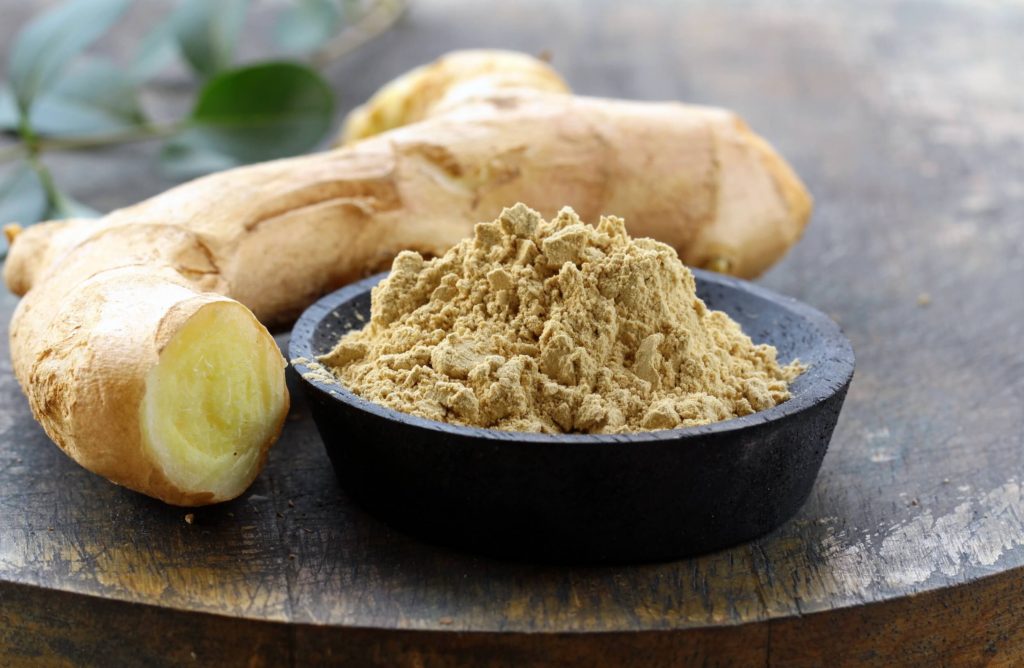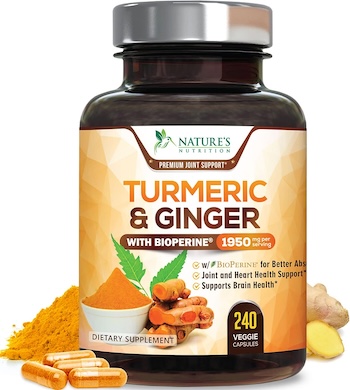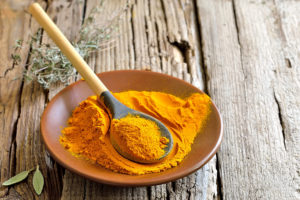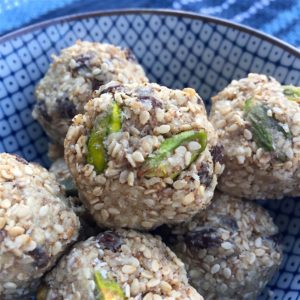Everyone’s heard of ginger before. It’s a common cooking ingredient, a great way to add flavor to meals, but ginger (also known as Zingiber Officinale) is so much more than just a common spice. In fact, when it comes to ancient healing traditions, ginger is one of the most valuable herbs in the world. Traditional Ayurvedic healers from the Indian subcontinent have been using ginger for literally thousands of years to treat everything from upset stomach to joint pain to motion sickness and beyond.
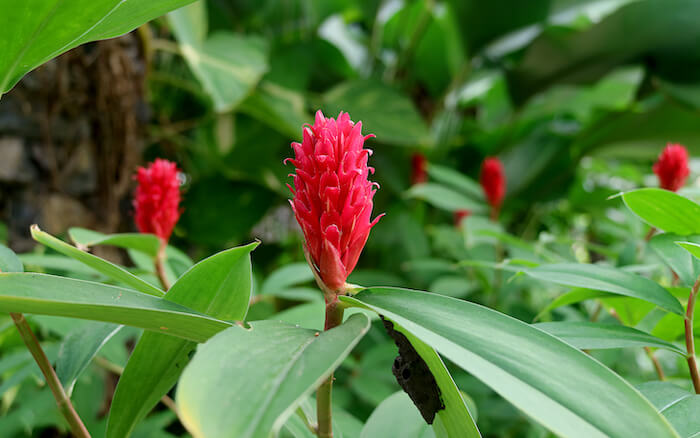
What Is Ginger, Exactly?
You might be familiar with the idea of ginger as an ingredient, but did you know that it’s a flowering plant that grows naturally in Southeast Asia? It’s the rhizome of the plant that’s used as an herbal medicine; this is the part of the stem that’s beneath the ground, similar to the root of the plant. It’s genetically similar to many other Ayurvedic herbs such as turmeric and cardamom, and you can prepare ginger in many different ways, though it’s commonly either grated fresh or dried and powdered.
The Many Health Benefits of Ginger
Ayurvedic healers have been using ginger for thousands of years effectively. You can use this Asian herb to help fight off common colds or the flu, treat nausea, make it easier to digest food, and in many other ways. Scientists have found that the active ingredient in ginger that’s behind this miraculous activity is gingerol, which is a natural oil that is also responsible for the flavor and scent of the herb. Here are a few ways that both Ayurveda and modern scientists have used this healing spice to make our life better.
1. As an Antioxidant and an Anti-Inflammatory
Ayurveda practitioners have used ginger to reduce inflammation and swelling in the people they treated. The reason that ginger is so effective in this role is that the root has anti-inflammatory and antioxidant properties thanks to gingerol. Not only does this mean you can use ginger to help reduce swelling, but you can also help support overall better health by using ginger to eliminate the types of free radicals within your body that lead to oxidative stress.
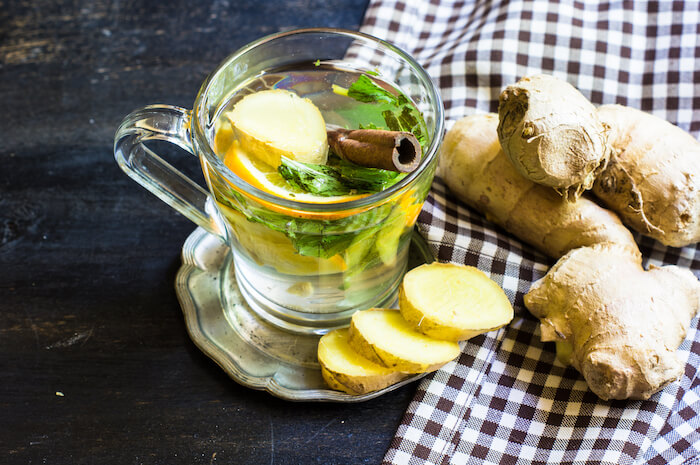
2. As an Anti-Nausea Agent
Ginger’s ability to settle an upset stomach is well-known and has been proved by scientists who spent some time researching its ability to act as an anti-nausea agent. Modern research has found it’s so effective in reducing nausea that it has been used as a treatment for patients undergoing chemotherapy.
Ayurvedic practitioners have been recommending ginger to pregnant women for millennia, as it’s one of the best treatments for morning sickness ever. Still, it’s best to check with your OB/GYN before taking ginger while pregnant, just to make sure you don’t have any health conditions that might not combine well with ginger in your diet.
3. Help with Joint Pain
If you suffer from joint pain caused by rheumatoid arthritis, you know how you’d do anything to get some relief. Well, research has found that you can use ginger as a treatment for joint pain, with scientists finding that reductions in pain and disability occurred in a number of patients.
4. Help with Blood Sugar
This one’s something that even the most learned Ayurvedic healer might not have known: ginger might be a great way to help people suffering from type 2 diabetes control their blood sugar! It turns out that daily blood sugar and A1C levels were reduced from between 10% to 12% in patients who took a powdered ginger supplement. This might not seem like much, but it’s more than enough to make a difference in the lives of diabetics.
5. Help with Chronic Indigestion
If you’ve ever had indigestion, you know what it’s like to wish for something, anything, to take away your pain and discomfort. If you’ve got chronic indigestion, it’s even worse. Ginger has been used to help with indigestion for a very, very long time, and it’s thought that its ability to increase the speed of gastric emptying is what’s doing the heavy lifting here; one of the main culprits behind chronic indigestion, after all, is when food doesn’t leave your stomach at the right speed. This is yet another example of scientific research confirming, once more, what traditional healers have known since time immemorial.

6. Help with Reducing Menstrual Pain
Ginger has long been associated with better women’s health. Just like it’s a traditional remedy for morning sickness, it’s also one for menstrual pain. Traditional Ayurveda approaches to treating menstrual pain see ginger used quite often, and again it looks like the herb’s naturally strong anti-inflammatory properties are the scientific reason behind its long use. Researchers have found that your body pretty much treats ginger the same way as it treats ibuprofen, making it just as effective as NSAIDs for pain reduction. If you don’t like relying on modern pain relief systems but prefer trusted Ayurvedic approaches, you can rest assured that ginger will help.
7. Fighting Infections
This pungent aromatic herb also has a role in protecting against respiratory viruses and drug-resistant bacterial and fungal infections. In fact, a 2013 article in J Ethnopharmacol chronicled a study that appeared to show that this spice is effective in combating RSV (Respiratory Syncytial Virus) which is most common among children under the age of two. Moreover, a 2011 study in the Journal of Microbiology and Antimicrobials determined that ginger may help to combat Staphylococcus aureus and Streptococcus pyogenes more effectively than three common antibiotics.
8. Radiation
Radiation exposure is one of the most talked-about health risks in today’s society. We now know more than ever that this type of toxic energy is dangerous to the body.
Ginger may be able to help fight off some radiation damage as well! Some sources claim that the antioxidants found within this plant can make up for any cell-damaging effects caused by ionizing radiation on tissues and cells.
9. Heart Health
Here is a health trend you may not have heard before: ginger is good for your heart! This kitchen-time healer has been shown to reduce high cholesterol, improve circulation, and protect against blood clots. What’s healthier than reducing your own risk of developing heart disease? Studies show that people who take a small amount of ginger daily have lower LDL and total cholesterol levels than those who don’t consume this root at all. Ginger can also help remove plaque from the arteries.
The Last Word on This Wonder Herb
At this point, it should be quite clear that ginger is so much more than just a spicy herb. Modern doctors and scientists are finally saying what Ayurvedic healers have known for thousands of years: ginger has so many different health benefits across so many different types of body functions. We haven’t even gone into all of them here – there’s also research being done into ginger’s effectiveness when it comes to weight loss! Is there anything that this miracle herb cannot do?
You can reap the benefits from ginger quite easily by adding it to your diet, incorporating it into recipes and meals. If you don’t like the taste but still want the benefits, you can also take ginger supplements in capsule form, but make sure to always talk to your doctor before beginning any dietary supplement – just to be safe. That way, you can ensure you’ll be getting all the benefits of this amazing Ayurvedic herb!
Resources:
https://pubmed.ncbi.nlm.nih.gov/18037515/
http://www.ncbi.nlm.nih.gov/books/NBK92775/
https://nccih.nih.gov/health/ginger
DISCLAIMER: These statements have not been evaluated by the Food and Drug Administration. All information and statements on the projectwellnessnow.com website are for educational purposes and are not intended to replace the advice of your healthcare provider. Project Wellness Now does not dispense medical advice, prescribe, or diagnose illness. The views and nutritional advice expressed on our website are not intended to be a substitute for conventional medical service. If you have any medical condition, see a healthcare provider of choice. See full medical disclosure here==>
YOU MAY ALSO LIKE:
13.1 MANTRAS TO GET YOU THROUGH YOUR NEXT MARATHON
By Braden ToblerThere has been a study on mantras and it turns out there could be a lot more to them…
NATURAL HEALING AND THE POWER OF POSITIVE THINKING
We are in an age when the mind-body connection is being increasingly explored. Often looked at as a negative, the “placebo…
8 HOLISTIC HEALTH QUOTES TO INSPIRE YOUR WELLNESS JOURNEY
Staying motivated along your path of wellness journey can be one of your biggest challenges, especially when life’s stresses start adding…
TURMERIC: INTRODUCTION TO AN HERBAL POWERHOUSE
Among all the medicinal herbs, turmeric is the one with the most wide-ranging scientific validation. Though originally used in Ayurveda and…
YOGA FOR THE KAPHA SEASON
In Ayurveda, spring is known as Kapha season. As the earth starts to thaw after the colder months, so do our…
RAW SESAME PISTACHIO BALLS
Sesame seeds are the latest superfood. They’re not only good for your heart and blood pressure, but they also balance hormones!…

